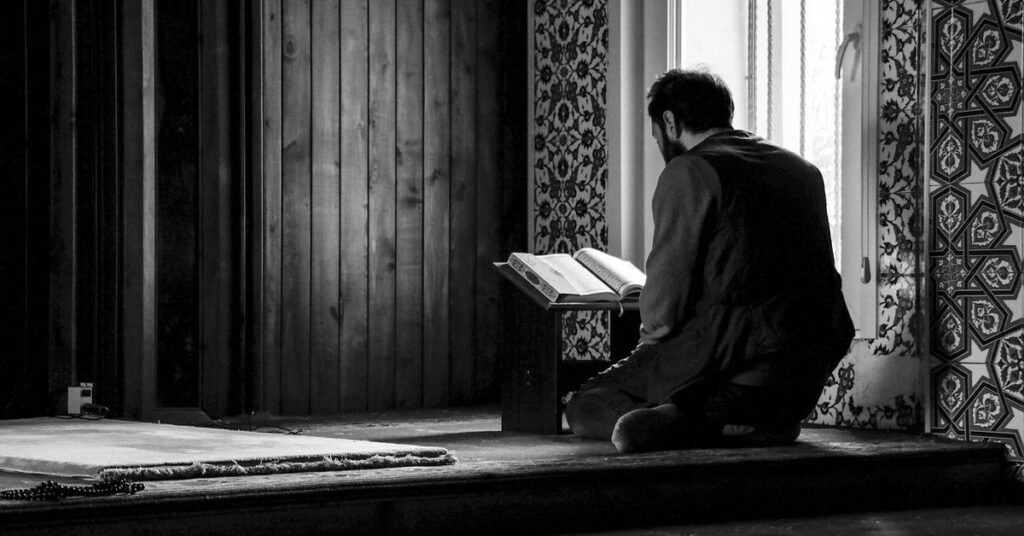My Journey Toward Centring ʿIbādah
Living in remembrance of Allāh and centring your life around ʿibādah requires intentionality, effort, and steadfastness. For me, this has been an ongoing lesson that I’m still learning.
Like many Muslims, I’ve struggled with finding that balance between my worldly responsibilities and spiritual goals.
There are moments, especially after a long day, where I catch myself wondering how did I spend my time today? It’s a question that creeps in just before sleep or during those quiet moments after work. We’re all juggling so much – deadlines, projects, meetings – and for me, constantly travelling for work. Time feels like it slips away faster, and life seems to move at double the speed.
I’ve had to ask myself some tough questions recently, especially as I try to fit Qur’ān study into my week. For me, it can be a demanding schedule trying to hold onto my Qur’ān lessons and learning, despite the distractions of life’s other commitments. Some days, I don’t make it to my classes, and other days, I feel like I’m just going through the motions, too tired to focus and unable to learn.
But it’s in these moments that I’m reminded of the ḥadīth of the Prophet Muḥammad ﷺ: “Take advantage of five matters before five other matters: your youth before you become old, your health before you fall sick, your wealth before you become poor, your free time before you become preoccupied, and your life before your death.” [Jāmiʿ al-Tirmidhī]
This ḥadīth has started to feel like an even more personal reminder for me every time I catch myself drifting through the motions of work and life without purpose. No matter how busy things get, I know there must be a balance because the truth is, I’m not getting any younger and time moves on whether we’re using it wisely or not.
What I Thought Success Looked Like
When I first moved to my current location for work, I was focused on getting established professionally. It was a new country, new job, new culture, and a new life for me. My job involves some travel and long hours, so this first year has felt like a race to keep up. It was easy to convince myself that I’d make time for the Qur’ān later, once things settled down.
But to be honest, things never really settle down. There’s always the next project, the next deadline, or the next trip. I still read the Qur’ān as part of daily wird, but I made a commitment and the longer I put off my proper commitments to the Qur’ān, the more disconnected I felt from what really mattered to me. My ḥifẓ classes started slipping, my tajwīd practice was inconsistent, and I could feel this growing frustration building up. It was a sobering realisation of the āyah in the Qur’ān; “Competition in [worldly] increase diverts you until you visit the graveyards.” (Sūrah al-Takāthur, 102:1-2)
I realised that no matter how well things were going at work, there was this persistent sense of something missing. Real success is in showcasing the attributes of īmān, and I couldn’t afford to ignore that anymore.
ʿIbādah in the Centre of Everything
The realisation that ʿibādah couldn’t be relegated to the margins of my life didn’t come as a sudden epiphany. Rather, it was a gradual awakening, punctuated by moments of frustration and quiet reflection. I knew I couldn’t continue treating my religious commitments as an afterthought, but the path to integration felt unclear.
The shift didn’t happen overnight. Honestly, I’m still in the middle of it. But there was a point where I realised, I couldn’t treat learning like something I just squeeze into the leftover parts of my day. If I wanted to stay spiritually connected, especially with all the demands of my job and life, I had to make it a priority.
I’m not saying I’ve figured it all out. Some days, I still feel like I’m failing to keep up with my Qur’ān lessons or slipping on my ḥifẓ goals. But I’ve learned that it’s not about how much time I dedicate, it’s about consistency. The Prophet ﷺ said: “The best of deeds are those done regularly, even if they are small.” [Ṣaḥīḥ al-Bukhārī]
I’ve heard and understood this ḥadīth before, but truly internalising it has been a game-changer for me. I’ve stopped feeling guilty for not being able to do everything perfectly. Instead, I focus on doing what I can with sincerity and sticking to it.
It’s a relief knowing that Allāh ﷻ understands our limits. He isn’t asking for perfection, just effort and sincerity. And that has helped me stay grounded even when life feels overwhelming, and I start to admonish myself too much.
A big part of what’s kept me steady on this path is the support of my Qur’ān teacher. He’s incredibly knowledgeable and patient, showing us by example that it’s not about how quickly we progress, but how consistently we put in the effort. He invests so much time into each of us, guiding us not just through the technical aspects of reciting and memorising, but in how he shares reminders, accommodates all our shifting times, and cultivates a connection between us. Knowing that I’m not on this journey alone, that there’s someone who understands our struggles and is there to encourage us, has been invaluable. May Allāh ﷻ reward him immensely.
Overcoming the Guilt of Inconsistency
One of the most challenging aspects of this journey has been grappling with guilt. If I’m being honest, it has been one of my biggest struggles. It creeps in when I miss a class, when I realise days have passed without proper meaningful Qur’ān engagement, when I feel the distance between who I am and who I aspire to be. This guilt, intertwined with anxiety about falling short, has at times threatened to overwhelm me.
But I’m learning to reframe these feelings. The guilt, I’ve come to realise, is a sign that my heart still yearns for closeness to Allāh. It’s a reminder that despite my shortcomings, my spiritual aspirations remain intact.
It’s a sign that my heart still wants that connection with Allāh, and that’s something to be grateful for. Allāh ﷻ reminds us in the Qur’ān: “Say, ‘O My servants who have transgressed against themselves, do not despair of the mercy of Allāh. Indeed, Allāh forgives all sins. Indeed, it is He who is the Forgiving, the Merciful.’” (Sūrah al-Zumar, 39:53)
No matter how inconsistent I’ve been, there’s always a way back. It’s not about being perfect, it’s about continuing to strive. What keeps me going is knowing that, even when I falter, if my intention is sincere, that effort still counts. It’s a long journey, and I’ve accepted that there will be ups and downs.
What’s also helped me along the way is knowing I’m not alone. I’m on this journey with other brothers, each of us with our own challenges and distractions but all with the same goal: to please Allāh by learning His words. There’s a kind of silent support in knowing you’re striving alongside others, and that collective energy pushes me to keep going, even when it’s tough.
To anyone reading this who feels the struggle between worldly responsibilities and spiritual goals, know that you’re not alone. We all face those moments when it feels like we’re falling short. But the key is to keep striving. Don’t wait for the perfect moment or balance—it might never come. Instead, start small, take the steps you can, and trust that Allāh will guide you through.
Practical Steps Going Forward
This is what struggle is: to navigate this journey of reconciling worldly responsibilities with spiritual growth and the ultimate purpose of worshipping Allāh. I’m starting to discover some practical strategies that have made a difference. While everyone’s path is unique, these approaches are hopefully helping me maintain a connection with my personal religious commitments, including the Qur’ān amidst the demands of daily life:
Start Small: I used to think I needed to set aside big chunks of time for Qur’ān study, but that only left me feeling overwhelmed. Now, I try to start with just a few verses a day. It may not sound like much, but it keeps that connection alive, and over time, the consistency builds.
Use Your Commute or Downtime: Since I travel a lot for work, I can use that time to listen to Qur’ān. It’s a way to stay connected, even on the move. I have started substituting listening to talks with listening to recitation, it’s an intentional change to habituate the words of Allāh in my routine.
Integrate Dhikr: While walking to meetings or waiting in line, I use those moments to remember Allāh. Even in the middle of a hectic workday, making tasbīḥ, taḥmīd, or other dhikr helps me not stay heedless and immersed all day in worldly affairs. I feel my heart is inclined towards striving when I do this more.
Be Gentle with Yourself: There will be days when you miss a class or get caught up in the whirlwind of life. That’s okay. What matters is that you don’t give up. Allāh’s door is always open to those who turn back to Him. This is perhaps my biggest shortcoming as I tend to spiral and make things worse.
I’m still on this journey, figuring it out day by day. I’ve learned that taqwā isn’t something you arrive at and then maintain effortlessly. It’s a daily effort, a choice to make Allāh the centre of your life, even when the world is pulling you in every direction.
And in those moments when you feel like you’re drifting, remind yourself of Allāh’s mercy. Turn back to Him, make a small intention, and keep going. After all, the journey to Allāh is more important than the destination. Each day that we live with intention, seeking His pleasure, is a success in itself.
May Allāh make us among those who live our lives with taqwā, who seek Him in every moment, and who find peace in the remembrance of Him. Āmīn.
[Written by a student at Al-Nujum Institute]





2 thoughts on “Imperfect Progress: My Journey to Centre ʿIbadah in a Busy Life”
Excellent article, māshā’Allāh.
Brilliant article! Allāh accept your efforts and allow us to be among those who have taqwā. Āmīn.